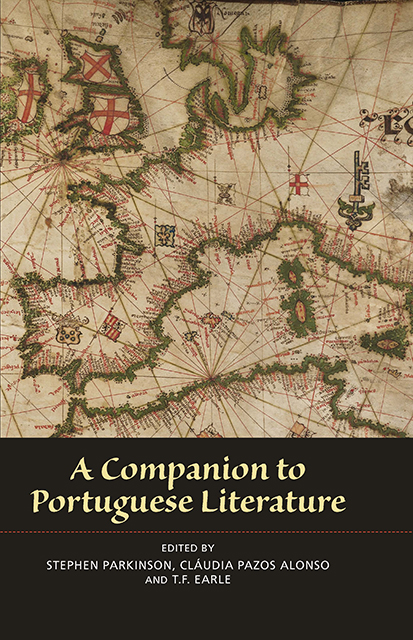Book contents
- Frontmatter
- Contents
- Acknowledgements
- Notes on the Contributors
- Introduction
- 1 Eight Centuries of Portuguese Literature: An Overview
- 2 The Medieval Galician-Portuguese Lyric
- 3 Fernão Lopes and Portuguese Prose Writing of the Middle Ages
- 4 Portuguese Theatre in the Sixteenth Century: Gil Vicente and António Ferreira
- 5 The Lusiads and the Literature of Portuguese Overseas Expansion
- 6 Lyric Poetry in the Sixteenth Century
- 7 The Seventeenth Century
- 8 The Eighteenth Century
- 9 Almeida Garrett: Founder of Modern Portuguese Literature
- 10 The Transition from Romanticism to Realism: Alexandre Herculano, Camilo Castelo Branco and Júlio Dinis
- 11 Eça de Queirós: A European Writer
- 12 Fernando Pessoa and the Modernist Generation
- 13 Narrative and Drama during the Dictatorship
- 14 Women Writers up to 1974
- 15 Writing after the Dictatorship
- 16 Portuguese Literature in English Translation
- Index
14 - Women Writers up to 1974
Published online by Cambridge University Press: 03 March 2023
- Frontmatter
- Contents
- Acknowledgements
- Notes on the Contributors
- Introduction
- 1 Eight Centuries of Portuguese Literature: An Overview
- 2 The Medieval Galician-Portuguese Lyric
- 3 Fernão Lopes and Portuguese Prose Writing of the Middle Ages
- 4 Portuguese Theatre in the Sixteenth Century: Gil Vicente and António Ferreira
- 5 The Lusiads and the Literature of Portuguese Overseas Expansion
- 6 Lyric Poetry in the Sixteenth Century
- 7 The Seventeenth Century
- 8 The Eighteenth Century
- 9 Almeida Garrett: Founder of Modern Portuguese Literature
- 10 The Transition from Romanticism to Realism: Alexandre Herculano, Camilo Castelo Branco and Júlio Dinis
- 11 Eça de Queirós: A European Writer
- 12 Fernando Pessoa and the Modernist Generation
- 13 Narrative and Drama during the Dictatorship
- 14 Women Writers up to 1974
- 15 Writing after the Dictatorship
- 16 Portuguese Literature in English Translation
- Index
Summary
In 1858, with his usual sharp wit, Camilo Castelo Branco remarked that ‘Over the course of the last fifty years ladies had not been reading novels, the reason for which took me many a sleepless night to figure out: they did not know how to read.’ With this statement, he was succinctly expressing his dismay at the negative effect of women's lack of educational opportunities, but equally how puzzling he found this situation at a time when change was already, slowly but surely, under way.
Indeed, the visible rise of, not only the woman reader, but also the ‘woman of letters’ in Portugal, from the 1860s onwards, was heralded by women such as Guiomar Torresão (1844–98), Maria Amália Vaz de Carvalho (1848–1921), and Caiel (Alice Pestana) (1860–1929), who left their imprint on a male-dominated cultural landscape, through various permutations of the following: political writing, journalism, moral treatises and work on education, as well as fictional, dramatic and/or poetic output. The most significant writer in the late nineteenth century, however, was arguably Ana Plácido (1831–95), author of the autobiographical work Luz Coada por Ferros (1863; Light Filtered Through Bars) and her masterpiece, the novel Herança de Lágrimas (1871; A Legacy of Tears).
Regrettably, to this day, literary history continues to privilege her role as a muse (she was the lover, and later the wife, of Camilo Castelo Branco) and neglect her as a gifted writer in her own right. Accordingly, there was (and still is) a missing link, which means that, unlike their British or French counterparts, Portuguese women writers at the dawn of the twentieth century did not have an established literary female legacy to look back to. This state of affairs is all the more ironic given that Herança de Lágrimas seeks precisely to voice a female-centred perspective on life. The first part of the novel records, through letters, the increasing attraction of Diana, a married woman, to a dashing prospective lover, Nuno. At the last minute, Diana rejects the path of adultery, prompted by the reading of a manuscript which forms the second part of the novel and recounts the story of her mother's tragic abandonment and death after giving in to illicit love.
- Type
- Chapter
- Information
- A Companion to Portuguese Literature , pp. 168 - 181Publisher: Boydell & BrewerPrint publication year: 2009
- 1
- Cited by



